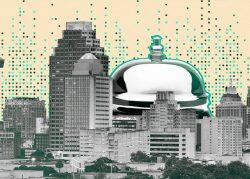Hotels in Texas’ cowboy town of Fort Worth, a favorite tourist destination, are recovering faster than neighboring Dallas, which is more dependent on business travelers.
By some measures, Fort Worth’s lodging industry will be “fully recovered” by year’s end, according to CBRE, which didn’t specify which data it was referring to. By two key metrics, Fort Worth’s lodging industry has already surpassed 2019 levels. The average daily rate, or ADR, hit $102.88 in March, compared with $100.21 in 2019, while revenue per available room, or RevPAR rose to $71.21, compared with $68.32 in 2019.
“Fort Worth is less reliant on corporate and group travel, so the hotel market was less affected by new variants,” CBRE executive Kevin Donahue said in a statement. “There is a strong tourism industry with attractions like the Stock Yards and different sporting arenas including AT&T Stadium and Global Life Field in Arlington.”
Comparatively, the average daily rates in Dallas are about $116.92, compared with $114.94 in 2019, while RevPAR rate is now $71.49, compared with $78.64 in 2019.
Read more


“Dallas is a market that is dependent on large group or corporate travel, so its hotel recovery is more in line with national trends,” Donohue said. “It’s important to factor in that this type of tourism is planned six to 12 months ahead of time, so we are still seeing the effects of the Omicron variant from last winter. Now that companies are more confident in planning events in the next year, hotels will benefit from the increase in travel.”
Corporate travel has slowly begun to return and is expected to continue to improve throughout 2022, Donahue said. Typically because corporate and group travel is planned up to a year in advance, events that began planning this year will take place in late 2022 or early 2023, he said.
Donahue also attributes Fort Worth’s much quicker recovery to several other factors.
For one, the influx of businesses and residents to the market has steadily increased the demand for lodging. Recent data shows that the Dallas-Fort-Worth-Arlington area alone had a population bump of more than 117,000 people across several counties, and more and more companies are investing in the city.
Although factors such as the Russia-Ukraine war and high gas prices have increased the risk of a slowdown, the CBRE Econometric Advisors remain positive that GDP, employment growth and a continued elevated Consumer Price Index (CPI) through 2023 will carry the market forward.
“To date, there has been no sign that the more than 50 percent increase in gas prices and the stock market’s hovering near bear-market territory are dampening hotel demand,” said Rachael Rothman, CBRE’s Head of Hotel Research & Data Analytics.
CBRE still expects better relative performance in vacation spots reachable by car this year, and Donahue anticipates that markets in other cities are not too far behind on the road to a full recovery post-pandemic.
“Austin, Dallas and Houston are about 17 to 20 percent below pre-pandemic levels, but these markets are forecasted to be close to pre-pandemic levels by the end of the year and all of the Texas markets are forecasted to exceed pre-pandemic levels by the end of 2023,” he said.
